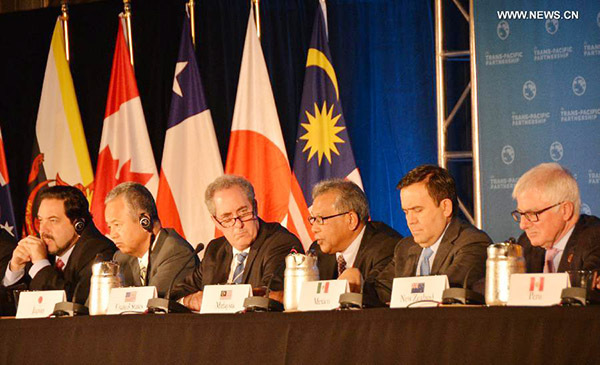 Trade ministers of the United States and 11 other Pacific Rim countries attend a press conference after negotiating the Trans-Pacific Partnership (TPP) trade agreement in Atlanta, the United States, on Oct. 5, 2015. (Photo/Xinhua) Move would help to strengthen economic ties throughout the Asia-Pacific region China should join the Trans-Pacific Partnership as soon as possible to build closer business ties with countries in the Asia-Pacific region and further cut the possibility of trade friction, according to a report by a leading think tank. The report, released on Thursday by the Beijing-based Center for China and Globalization, said that China should not be absent from the TPP after U.S. President Donald Trump decided to withdraw from the previous 12-nation trade pact. The report said that once in the TPP, China can improve its business integration in Asia and build better economic relations with Japan, South Korea and countries of the Association of Southeast Asian Nations. Wang Xin, CCG's deputy director, said that joining the TPP will advance the realization of its vision of domestic reform. "Widening the TPP exposes the limitations of the multilateral trade system," said Wang. Zhang Yunling, director of international studies at the Chinese Academy of Social Sciences, said: "It is possible that the U.S. may launch a trade war with China, but it may turn into a bigger and more far-reaching trade war." The U.S. withdrawal from the TPP has caused other members to readjust their policies regarding whether the TPP should welcome China. Some, including Australia and Chile, have been keen in recruiting China as a TPP member to enhance the degree of integration in the Asia-Pacific region. "Other TPP members such as Vietnam and Malaysia have also showed their desire to develop the Regional Comprehensive Economic Partnership as alternative to ensure their exports and factory businesses," said Zhu Feng, president of the Institute of International Studies at Nanjing University. Zhu said the TPP membership will also be practical for China to start talks on the Free Trade Area of the Asia-Pacific with other countries. This would be able to combine the TPP and the Regional Comprehensive Economic Partnership, to put an end to the economic fragmentation in the Asia-Pacific region that undermines economic integration, Huo Jianguo, former president of the Chinese Academy of International Trade and Economic Cooperation, said to meet the TPP demand, China must adopt measures to promote market-oriented reforms at home to diversify its companies' earning ability, open the market further and improve government supervision. |